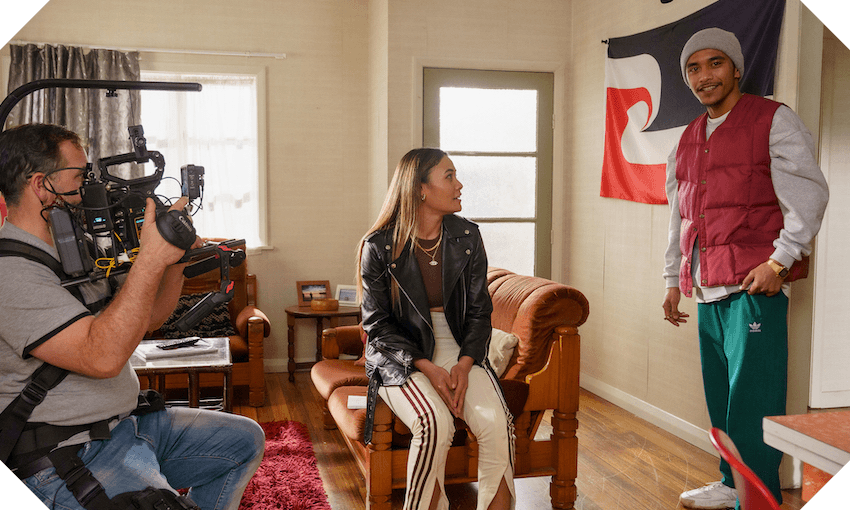The longrunning production works hard to counter destructive Māori stereotypes.
Throughout our TV and movie history, Māori have occupied only one of two roles – the angry addict or the model minority. We are either Jake “The Muss” Heke from Once Were Warriors or TK Samuels from Shortland Street, with no room for anyone in between. Recently, however, some productions have broken away from that mould by championing rich and nuanced Māori characters written by Māori, for Māori. One series leading this charge is Ahikāroa by Kura Productions, South Pacific Pictures, and Whakaata Māori – the fifth season of which was recently released online and on TV.
This drama follows the hectic lives of kura kaupapa raised urban rangatahi Māori, aiming to show the graphic craziness of the real world. As such, the show delves into many kaupapa. Some are gritty, like partying, alcohol, drugs and sex, but Ahikāroa also isn’t afraid to touch on nuanced aspects of te ao Māori, like politics and spirituality. Although the intended audience is those whose stories Ahikāroa highlights – rangatahi Māori – the show’s passionate fanbase has grown to cross the boundaries of age and ethnicity.
Ahikāroa’s lead writer, Annette Morehu (Tūhoe, Te Arawa, Te Aupouri, Te Rarawa), notes that it’s rare that any New Zealand drama, let alone a bilingual one, lasts five seasons. Turia Schmidt-Peke (Ngāti Tamaterā, Ngāti Hauā, Hāmoa) – who plays the intellectual and passionate character Geo – assumed it would be a one-season wonder. Five seasons later, the Ahikāroa whānau are stoked about their continued success, with Morehu noting that the show’s longevity gives Māori in the industry a safe workspace that opens doors for fluent te reo speakers to get paid to kōrero Māori
Nepia Takuira-Mita (Te Arawa, Hāmoa) – who plays Hemi, a character steeped in the mātauranga of old – believes Ahikāroa shows tamariki and rangatahi that “being Māori is a superpower”. He says it was amazing to incorporate things he learnt at kura kaupapa – like karakia and te reo Māori – into his paid work. After starting her career on Pākeha productions, Morehu says that Ahikāroa being embedded in te reo me ona tikanga was an awakening. “I don’t have to put my Pākehā voice on at work anymore”, she joked. For its tangata whenua crew, Ahikāroa is a home away from home and a natural continuation of the kura upbringing many of them had.
Fundamentally, the show is made with the current crop of kura kaupapa kids in mind, focusing on take and kaupapa that are relevant to them. Focusing on the next generation is vital because they’re “our rangatira for āpōpō“, says Nepia. Morehu is proud to write rangatahi-relevant stories that her younger self – as well as her nieces – would resonate with. In a very Māori way, those nieces even help with the writing, as Morehu admits she learns about authentic youthful slang from them. For Turia, using relevant kupu keeps young viewers grounded in the show, as does Ahikāroa’s focus on the light and dark tales of our complicated modern reality.
Those stories and experience include everything from sexual abuse, abusive relationships, takatāpui stigma and political issues like Ihumātao. “I have had so many people come to me and tell me how much it has helped them to see those stories being told,” says Morehu – noting that it has allowed viewers to work towards overcoming their trauma. With a sixth season already in the works, their approach of taking risks and telling untold stories clearly working.
Being a production that is by Māori, for Māori, allows Ahikāroa to deeply explore te ao Māori without having to explain everything for tauiwi. The longevity of the series is also a testament to the authenticity of Ahikāroa’s telling of the Māori experience – tangata whenua quickly call each other out when something isn’t tika. Because of that, Morehu and her colleagues feel a strong responsibility to tell the show’s tales authentically, while also continuing to deliver entertaining taglines promising “mākutu, murder and mayhem”.
The groundbreaking nature of Ahikāroa serves to counter the destructive stereotypes about Māori that have been entrenched through our mainstream media for decades. “Growing up I never saw Māori accurately portrayed because of a lack of Māori writers, producers and directors telling our stories”, said Morehu. But now she and her colleagues are actively proving that Māori are not just the Jake Heke or TK Samuels archetypes and that, in fact, most of us occupy the diverse space in between.
Episodes of Ahikāroa Season 5 come out at 9.30 PM each Thursday on Whakaata Māori and the show’s website. Fans with the MAORI+ app can view two episodes a week.





